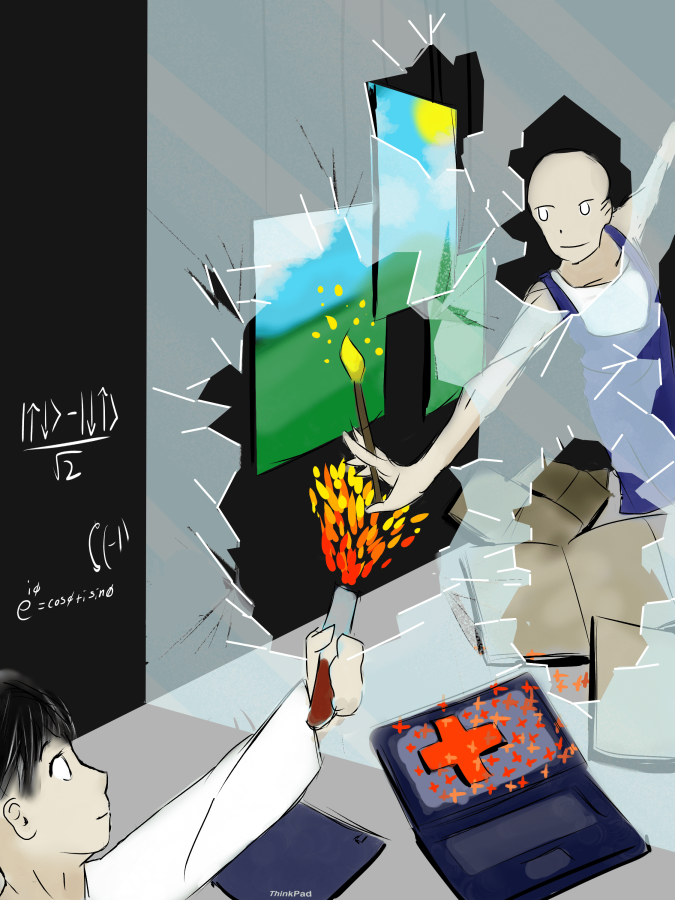On May 9, UC San Diego hosted its first Arts and Humanities Career Fair, a promising step in the right direction in focusing some energy on non-science major fields and bolstering its arts and humanities majors.
UCSD is largely regarded as a research-based, science-focused university. Despite the fact that UCSD is home to many successful and talented arts and humanities students and professors, their work is less often recognized. The science, mathematics, technology, engineering, and social science departments all enjoy more attention, acclaim, and generally more resources than do the arts and humanities departments. This is reflected in the awareness the science and technology career fairs get each time they are held, as there have been few opportunities for arts and humanities majors to meet with potential employers until now.
This year, UCSD hosted its first Arts and Humanities Career Fair. Held at the Price Center, the fair accommodated a wide range of companies and businesses — their posters, flyers, and tables all advertising their lines of work. The tables were arranged in semi-circle around the perimeter of the room, with students wandering from table to table and conversing with the employers. Some of them dressed in business casual, others in formal suits, others in their everyday outfits they wear to class. Instead of the expected hustle and bustle of a career fair, the environment was the opposite — it was relatively quiet.
Brian Cheng, a freshman data science major from Sixth College, is not an arts and humanities major, but decided to check out the booths all the same. He pointed out that, despite the fair’s title, not all of the businesses in attendance were strictly humanities-based.
“I’m just curious what humanities career fairs look like. But not all of these booths are from the humanities field,” Cheng said, indicating to a substantial line at Sony Electronics, much longer than any other booth’s at the fair. “The Sony booth I just went to is actually hiring for engineering jobs. I find it funny that they’re at a humanities career fair.”
Read More:
“Whitelash:” Student Theater Delves into Politics and the Value of Unit
The Library Special Collections and Archives: A Museum in our Midst
The Enrollment Conundrum at UCSD
Two spokespersons from one of the businesses there, Marriott International, maintain that the Marriott is a great place for students to start off, whether they’re interested in management, human resources, and much else. They have plenty of UCSD students working at their properties and have gained plenty of feedback from attending career fairs.
“Marriott itself is very focused on career growth and personal growth, so once you get your foot in the door, there’s no stopping you. You can move around to different departments and properties, and that’s the fun part about it,” Kim, , one of the Marriott employees, said. “We decided to come here today to inform students of that, and to let them know that even if there isn’t a specific position here that may interest you, there’s opportunity for growth.”
The beauty of the humanities majors, as Kim and her fellow employee Davina asserted, is that its versatility means that a student who majors in one field can apply their skills to a separate department and take the time to find what they love to do.
“The misconception is that you have to be a hospitality major to be in hospitality. Really, we are open to whatever you major in,” Kim said. “For example, I graduated as a psychology major. I don’t have the hospitality degree, but I’m in the front office, moving toward human resources. There’s a way for you to use what you’ve learned and the skillsets you’ve acquired.”
Kim and Davina had talked to students with a plethora of interests at the fair, all of whom they could see working in hospitality.
“We had someone who was interested in the audiovisual side, another interested in sales photography, another in human resources,” Kim said. “We’re getting a good amount of people here.”
Despite what the spokespeople from Marriott said, most of the businesses that attended the fair, such as 1789 Consultants, Marriott International, and the New Children’s Museum, were not specifically catered to humanities majors. The most popular one, Sony Electronics, was not humanities-based at all. Humanities majors include fields such as literature, music, philosophy, theatre, dance, and visual arts, and most of the companies in attendance were not in fact relevant to those majors. Apart from the New Children’s Museum, which is likely applicable to visual arts majors, not many of the businesses seemed to be specialized for any particular humanities field.
The lack of publishing businesses, performing arts companies, and journalism programs indicated that UCSD has a long way to go in giving its humanities majors the same attention it gives to its engineering majors. The humanities majors should not be thought of as the leftovers, the second fiddle to every STEM company.
Though this was the first arts and humanities career fair, and thus the event must be allowed the time to develop, the opportunities given to humanities majors there pales in comparison to those which STEM majors are provided. For UCSD to put all of its eggs in one basket, so to speak, would be a mistake.
Though the STEM fields are ever-growing and exceptionally popular at the present time, many argue that the humanities majors offer invaluable persuasive and critical thinking skills, and produce the best writers, communicators, and speakers. The fact that UCSD is making an effort to further the education and opportunities of its arts and humanities majors by hosting events such as this first career fair is encouraging, but is hopefully not the end of an attempt to make humanities majors feel valued, challenged, and motivated. Ideally, the arts and humanities career fairs will evolve, grow, and host a greater amount of companies relevant to specific arts and humanities fields.
As this was UCSD’s first ever arts and humanities career fair, it’s evident that the influence of science and technology fields is still dominant. Nonetheless, the arts and humanities career fair symbolizes the potential that UCSD has to open up doors for non-STEM majors and to give them chances at the opportunities they need to crusade their way through the world after college. It has the opportunity to do a lot more for its arts and humanities majors. Now it’s up to UCSD to follow through.
Art by Michi Sora.







